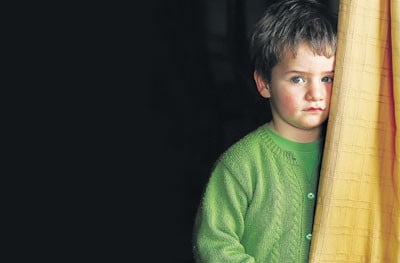There are many fearful and shy children, who struggle to relate and it costs them much separated from their parents. They do not feel relaxed outside their familiar surroundings and seem to enjoy, like their fellow leisure activities.
The parents comment that at home they "don't stop" or that they are very "talkative" and cheerful, but also a little bigheads or that they look for ways to get their way. In class they never end up behaving or showing themselves at home, and this is something that parents are shocked, because they do not understand how their child can act in such a different way in one context or another.
However we can observe a lack of emotional control that leads them to retreat into shyness and peer group or, on the other hand, the emotional outburst or want to grab the attention in more familiar contexts.
Many cases of shy, fearful and withdrawn children have been seen, with little skill in their movements and agility. These children "shy" because of their character and "cautious" have emotional problems and motor development. But after all this there is something in common: the fear.
It is this fear that prevents them relate or move your body in space safely and ability, slows development and limits their experiences.
But ... Can we modify this "character"? Where do we find the "balance" we all want for our children?
Our brain is the one that regulates and controls our emotions, who interprets the world around us. He who gives meaning to all the stimuli that come to us and makes us act in consonance with them.
If the nervous system does not play well this environment, the child's responses will not be appropriate, expressing afraid to move, which will take you to have limitations in motor experiences needed for proper development. If the child does not move properly in the world around you, if you do not feel capable, if he lacks confidence in his own body, then most likely this confidence is also absent in their relationship with others and with everything that happens to your surroundings. common situations can be interpreted as a threat or just difficult.
Important is to keep in mind that you have to stop saying that they are "Shy"or"awkward", are "fearful"or"stubborn"... but, above all, let's not say it in front of them because we will end up convincing them that they are. The child creates the concept of himself that we transmit to him from others. That is why it is essential that we transmit security to have confidence in himself and in what he does; we must let him move and encourage him to do so, always respecting his fears, approaching new experiences safely and at his pace, without haste, with patience and with confidence that the child will achieve it.
And will help you to know your limitations and abilities, enrich their motor development, will make you more confident in itself and as a result, live more confident in any of the situations that arise.
Definitely... the child will be happier.
Verónica Monsonís Far
Emotica, Espai de Benestar







